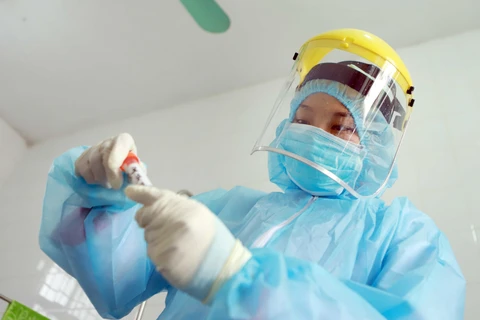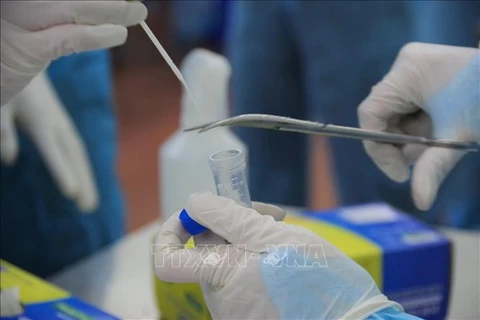HCM City (VNS/VNA) - As the new school year starts the risk of children catching and spreading infectious has also increased, leading to authorities and healthcare officials to call for action.
Tran Thi Mai Trinh, a doctor from the Paediatrics Ward under the Tam Anh General Hospital in HCM City, said that due to the immature immune systems, children in preschool and primary school age are very sensitive to infectious diseases.
When children go back to school, they often have to study and live in a crowded environment and classrooms often use air conditioners which lower air quality. Once children get sick, it is easy for small outbreaks to form.
She said that children who go to school are often susceptible to dangerous diseases such as COVID-19, influenza, encephalitis, pneumonia, and chickenpox.
Eye and skin diseases are also more contagious, especially in preschool and primary school age groups.
The back-to-school season is also in the rainy season, so diseases such as dengue fever, viral infections and asthma are also quite common.
When students go to school, they often do not drink enough water, which can lead to constipation. Equally, they might hold off going to the bathroom as the toilets are not clean, causing urinary tract infections.
Doctor Bach Thi Chinh, medical director of the Vietnam Vaccine Immunisation Centre System, said that the rise of COVID-19 alongside other infectious diseases such as influenza, encephalitis and meningitis was a "red” warning with children's health.
When children have respiratory diseases such as influenza, if they are not treated promptly, the disease may develop into pneumonia and respiratory failure, or lead to the onset of other diseases such as asthma and chronic obstructive pulmonary disease, causing children to be absent from school for a long time.
More dangerously, influenza can also develop, threatening children’s lives and future.
Encephalitis is also a dangerous disease that develops rapidly. If the patient survives, about 20% suffer from sequelae such as cerebral palsy, psychomotor retardation, multi-organ failure and amputation.
Doctor Chinh said that fortunately, dangerous diseases such as flu, chickenpox, meningitis and measles have effective preventive vaccines.
Parents should give their children full vaccinations against diseases, especially seasonal flu and meningitis, before children return to school.
The HCM City Department of Health (DoH)’s statistics show that the rate of immunisation for children in the city is at a low level.
The expanded vaccination programme’s goals in HCM City this year need to reach 95% of the total children. However, at the start of September the result is 76.6%.
The department said that the reason was a lack of supply of several kinds of vaccines since June this year, as well as the staff in charge of vaccination changing.
Furthermore, parents have forgotten vaccination schedules or are not interested in vaccination.
The municipal health sector is concerned that the failure to vaccinate children will create gaps in immunity in the community, putting children at risk.
The health sector will soon find solutions to ensure parallel implementation of both the general vaccination campaign and the COVID-19 vaccination campaign.
The DoH urges parents to protect their children's health so that their studies are not interrupted by a lack of vaccination leading to COVID-19.
Parents should not listen to rumours without scientific basis, or refuse the COVID-19 vaccine.
In addition to full vaccination, parents should pay attention to respiratory hygiene for children such as nasal drops, gargling with salt water and washing hands.
Adults themselves need to maintain their personal level of hygiene. For instance, when coming home, it is necessary to wash and disinfect hands before holding children to avoid spreading germs to children.
If abnormal health signs are seen, parents should take their children to reputable medical facilities for diagnosis and treatment.
As the dengue season peaks, parents need to pay attention to preventing mosquitoes. Children should wear long-sleeved clothes and use mosquito repellent sprays./.
Tran Thi Mai Trinh, a doctor from the Paediatrics Ward under the Tam Anh General Hospital in HCM City, said that due to the immature immune systems, children in preschool and primary school age are very sensitive to infectious diseases.
When children go back to school, they often have to study and live in a crowded environment and classrooms often use air conditioners which lower air quality. Once children get sick, it is easy for small outbreaks to form.
She said that children who go to school are often susceptible to dangerous diseases such as COVID-19, influenza, encephalitis, pneumonia, and chickenpox.
Eye and skin diseases are also more contagious, especially in preschool and primary school age groups.
The back-to-school season is also in the rainy season, so diseases such as dengue fever, viral infections and asthma are also quite common.
When students go to school, they often do not drink enough water, which can lead to constipation. Equally, they might hold off going to the bathroom as the toilets are not clean, causing urinary tract infections.
Doctor Bach Thi Chinh, medical director of the Vietnam Vaccine Immunisation Centre System, said that the rise of COVID-19 alongside other infectious diseases such as influenza, encephalitis and meningitis was a "red” warning with children's health.
When children have respiratory diseases such as influenza, if they are not treated promptly, the disease may develop into pneumonia and respiratory failure, or lead to the onset of other diseases such as asthma and chronic obstructive pulmonary disease, causing children to be absent from school for a long time.
More dangerously, influenza can also develop, threatening children’s lives and future.
Encephalitis is also a dangerous disease that develops rapidly. If the patient survives, about 20% suffer from sequelae such as cerebral palsy, psychomotor retardation, multi-organ failure and amputation.
Doctor Chinh said that fortunately, dangerous diseases such as flu, chickenpox, meningitis and measles have effective preventive vaccines.
Parents should give their children full vaccinations against diseases, especially seasonal flu and meningitis, before children return to school.
The HCM City Department of Health (DoH)’s statistics show that the rate of immunisation for children in the city is at a low level.
The expanded vaccination programme’s goals in HCM City this year need to reach 95% of the total children. However, at the start of September the result is 76.6%.
The department said that the reason was a lack of supply of several kinds of vaccines since June this year, as well as the staff in charge of vaccination changing.
Furthermore, parents have forgotten vaccination schedules or are not interested in vaccination.
The municipal health sector is concerned that the failure to vaccinate children will create gaps in immunity in the community, putting children at risk.
The health sector will soon find solutions to ensure parallel implementation of both the general vaccination campaign and the COVID-19 vaccination campaign.
The DoH urges parents to protect their children's health so that their studies are not interrupted by a lack of vaccination leading to COVID-19.
Parents should not listen to rumours without scientific basis, or refuse the COVID-19 vaccine.
In addition to full vaccination, parents should pay attention to respiratory hygiene for children such as nasal drops, gargling with salt water and washing hands.
Adults themselves need to maintain their personal level of hygiene. For instance, when coming home, it is necessary to wash and disinfect hands before holding children to avoid spreading germs to children.
If abnormal health signs are seen, parents should take their children to reputable medical facilities for diagnosis and treatment.
As the dengue season peaks, parents need to pay attention to preventing mosquitoes. Children should wear long-sleeved clothes and use mosquito repellent sprays./.
VNA























